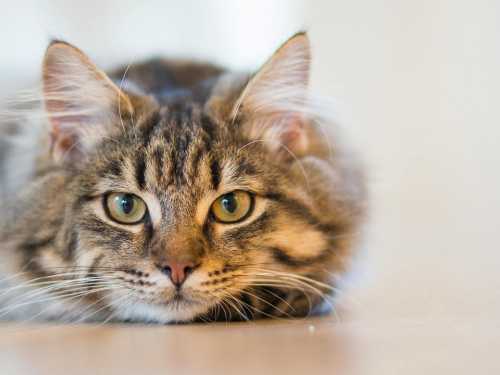
Fish oil is not a medicine, but a useful daily supplement to your cat's diet. Its natural sources are the meat and liver of cold-water fish such as trout, salmon, or pollock.
You can also buy ready-made fish oil supplements at pet stores and veterinary pharmacies, so finding the right option won't be difficult.
What are the benefits of fish oil for pets?
Veterinarians recommend adding fish oil to the food of cats that are fed a natural diet. This is because natural diets (for example, poultry-based) often contain a lot of Omega-6 fatty acids but little Omega-3. Adding fish oil, rich in EPA and DHA, helps balance this ratio and reduce the risks of chronic inflammation.
The main benefits of fish oil:
- Helps reduce inflammation. The beneficial acids in fish oil help reduce the risk of developing and the intensity of inflammation in the kidneys, heart, and joints, supporting your pet's overall health.
- Makes your cat's coat shiny. The appearance of the coat is an indicator of the health of any animal. Fish oil prevents the coat from becoming brittle, making it elastic, shiny and thick.
- Helps control allergic reactions and itchy skin. Itching from allergies causes swelling, discomfort, and pain in the skin. The most valuable Omega-3 acids in fish oil — EPA (eicosapentaenoic acid) and DHA (docosahexaenoic acid) — have a powerful anti-inflammatory effect, which helps significantly reduce itching and skin irritation.
- Fights dandruff. Omega-3 fatty acids will help relieve a pet suffering from dandruff problems by smoothing, renewing and nourishing epidermal cells.
- Brain nutrition. Fatty acids are highly digestible “food” for brain cells and the organs of vision. Fatty acids are especially important for young kittens and pregnant cats.
- Supports heart health. The components of fish oil help support the heart muscle, help reduce the risk of arrhythmia and blood clot formation due to their blood thinning effect.
- Supports joint health. Omega-3 fatty acids help reduce inflammation in the joints, relieving pain from osteoarthritis and improving the animal's mobility.
Symptoms of Omega-3 deficiency
Signs that indicate that your cat may be lacking Omega-3 fatty acids in their diet:
- the coat is dull, falling out;
- dandruff;
- claws are peeling and breaking;
- Joint problems: Your cat may be avoiding jumping, limping, or experiencing pain in their paws. This could be a sign of arthritis, where Omega-3s can help reduce inflammation.
How to give fish oil correctly and what to pay attention to?
Before introducing a supplement into your diet, it is worth considering several important points:
1. Consultation with a veterinarian. This is the most important step. Only a specialist can determine whether your cat needs a supplement, choose the correct dosage, and rule out possible contraindications, especially if there are chronic diseases.
2. Correct dosage. Too much fish oil can be harmful. Too much can cause digestive upset, blood clotting problems (which is dangerous before surgery), and lead to weight gain. Always follow the instructions on the package or your veterinarian's recommendations.
3. Product quality. Choose fish oil from trusted manufacturers that has been purified from heavy metals (mercury, lead) and other toxins. Also, make sure the product is fresh and not rancid, as oxidized fat can be harmful to your health. Store it in a cool, dark place.
Important note
For disease prevention, it is advisable to give your cat fish oil if your pet is on a natural diet. High-quality ready-made food already contains Omega-3 fatty acids in balanced amounts, so additional supplementation without the recommendation of a veterinarian is usually not necessary.





